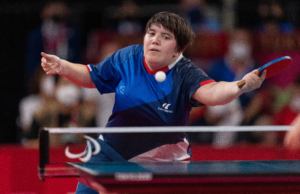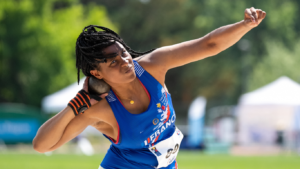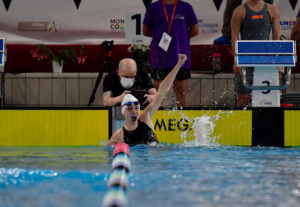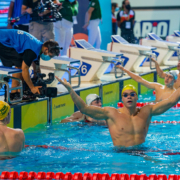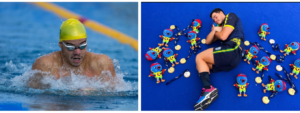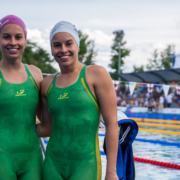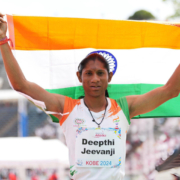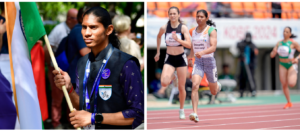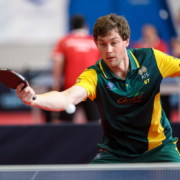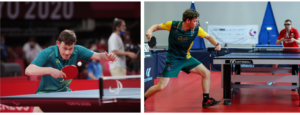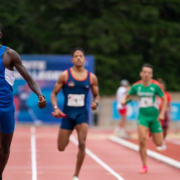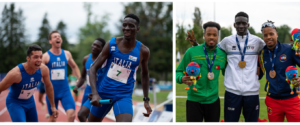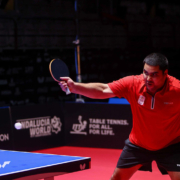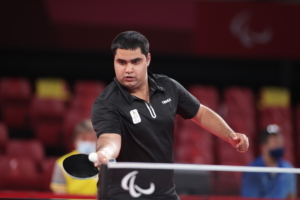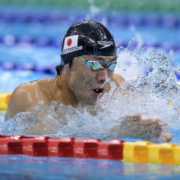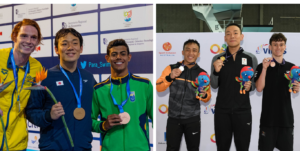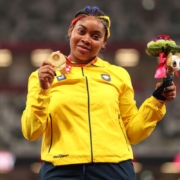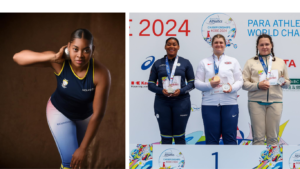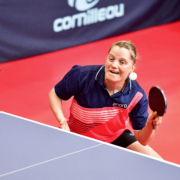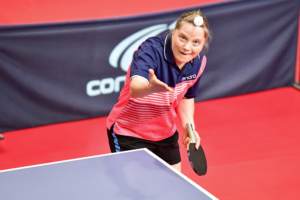Debora and Beatrice Carneiro are two identical twins from Brazil and they both have intellectual impairment. They both have made big names for themselves at the 2023 Virtus Global Games recently by winning ten gold and three silvers collectively and will be competing at their second Paralympic Games together at the Paris 2024, although Beatrice will be competing in her third one.
Born on May 7, 1998, in Maringá-PR, Brazil, the twins entered the world prematurely, facing initial health challenges that required specialized care. Despite their early struggles, they thrived under the attentive guidance of their paediatrician, Dr. Wilson Ota. They both faced intellectual challenges, however, they found their calling in swimming. With their natural talent evident, they began training with a local team, gradually transitioning to competitive swimming under the guidance of dedicated coaches.
“Their childhood was marked by a love for swimming, sparked by the family’s move to a new home with a pool in 2002. What began as a safety measure evolved into a lifelong passion and source of joy. Despite encountering learning difficulties in their early education, Débora and Beatriz found a supportive environment in an inclusive school, where they flourished academically,” said Eraldo Volpato Carneiro, proud father of Debora and Beatrice Carneiro.
Tragedy struck the Carneiro family in 2007 when the twin’s mother, Vivalda, was diagnosed with lung cancer. As she battled the disease, the family’s focus shifted to her care, navigating a challenging journey marked by hospitalizations and treatments. Unfortunately, their mother lost her battle with cancer in 2009 and their father became the sole caregiver for the eleven-year-old girls, determined to provide them with the best possible future.
The twins faced a lot of adversity in their childhood due to their impairment. Beatrice states,
“Our biggest difficulty today is studying, not being able to keep up with the students, counting coins, managing different tasks, etc. We learned a little, but we still had a lot of difficulty. We can’t get a driving license because we are banned. But in swimming, for us, there aren’t difficulties, there is no such thing as disability, but rather efficiency.”
“We faced a lot of prejudice. The teachers and students said that we had the mind of a 2-3-year-old child. We suffered a lot of bullying. Even the teachers were prejudiced against us when we couldn’t take the tests properly. Then in the Mexico 2017 WPS Championship, I won silver and I said in an interview that see if they could do what I did today, see if they ever climbed on the international podium, and see if they had an international medal. Everything I do, they must be reflecting now, because despite everything we suffered back then, we made a great comeback.”
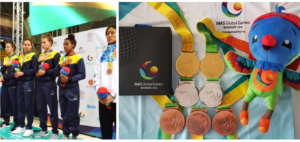
Debora and Beatrice Carneiro receiving Gold medals in the relay at the 2019 Virtus Global Games. Photo Credit: Carneiro sisters
Doors to the international swimming competitions for the twins opened in 2015 when they registered themselves under Virtus eligibility (former INAS-FID). Their inaugural journey into the international swimming arena commenced at the 2015 Open Internacional Caixa Loterias in São Paulo, Brazil. It was a significant occasion, marking the dawn of a new chapter in the extraordinary journey of Debora and Beatrice Carneiro. Beatrice Carneiro made history in the Rio 2016 Paralympic Games as Brazil’s first female swimmer in the S14 category. Though she couldn’t make it to the podium, it was a heartfelt milestone in a journey marked by courage and determination.
Thriving in Virtus competitions, Beatrice and her twin, Debora, showcased their talents at the 2017 INAS World Swimming Championship, with Debora claiming 10 medals and Beatrice securing 6, including a title in the 200m Breaststroke. As key members of Brazil’s relay team, their synchronicity in the water was unmatched.
Their legacy reached new heights at the Global Games 2019, where they amassed an impressive collection of medals of two gold, two silver and three bronze.
Despite the challenges posed by COVID-19, the Tokyo 2020 Paralympic Games held a special significance for the Carneiro twins. It marked their inaugural Paralympic appearance together, a milestone made even more memorable by Debora’s debut on the grand stage.
In the S14 100m Breaststroke, the twins found themselves as each other’s rivals. While Beatrice secured third place by defeating her twin just by mere microseconds at Tokyo 2020, Debora emerged victorious in their showdown at the Manchester 2023 World Para Swimming Championship in the same event.
The twins have enjoyed supporting each other whilst pushing each other to give their best in their event.
“The feeling is incredible! We’re always cheering for each other, and even though we want to beat each other, we also encourage each other. So there’s no way to describe it, because we are sisters and the feeling is the same. I think she will say the same thing I believe. And the goals are also the same, of wanting to go to the Paralympics Games and winning a lot of medals. The feeling is very good, but the fight is big too because we are in the same fight to win the same medal in Paris 2024,” Debora told Virtus explaining their bond.
“The coolest thing about competing together is that we get on the podium together. We have fun but we also have a bit of rivalry. This is also very important for your career because two sisters getting on the same podium is difficult. So we have to fight together,” she further added.
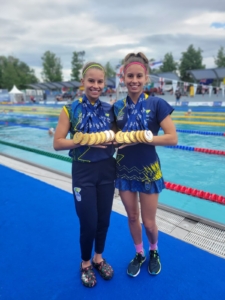
Carneiro sister at 2023 Virtus Global Games. Photo Credit: Kellerman
In 2022, with the support of a sponsorship project, they underwent significant improvements in their physical training, leading to impressive performances. Their success continued at the Manchester 2023 with one gold and one bronze and at the Parapan American Games 2023 in Santiago de Chile, where they both won multiple medals, with Beatriz setting a new Americas Record in the 100-meter breaststroke.
However, it was at the 2023 Virtus Global Games where their brilliance truly shone. With an impressive haul of ten golds and three silvers collectively, the twins solidified their status as elite athletes on the world stage, leaving an indelible mark on the hearts of all who witnessed their triumph.
The twins shared a heartfelt message for the parents who have children with intellectual impairment,
“Never be ashamed of your child, even if they have Down’s syndrome or any other intellectual impairment. Encourage them to step out into the world and pursue their dreams. Don’t give up on your dreams for them either, because one day they could be competing in places like Paris, Brisbane, or Los Angeles. It’s not about being smart, but about letting them experience life. Children may start out under their parents’ wings, but as they grow, they need to explore the world. Support them in enjoying sports, because it’s a fair game and a beautiful part of life. Dedicate yourselves to helping them achieve their dreams, because it’s worth it.”
“To all those wonderful children with intellectual impairment, if you are just starting out in sports, remember that the world is full of amazing opportunities! Don’t be afraid to step out and explore. Enjoy the fun of swimming, judo, athletics, or any sport you love. Dedicate yourself to your dreams, because you can achieve great things. The world is wonderful, so live your life to the fullest and have fun with sports!”
Their remarkable achievements have not only solidified their status as elite athletes but have also inspired many others with their dedication and determination.
Join Virtus’ #MakingInvisibleVISIBLE campaign and make their inspiring journey visible.
What is Intellectual Impairment?
Intellectual impairment is an umbrella term to describe a vast and neuro-diverse group of people with varying types of cognitive impairments including intellectual disability, Down syndrome and autism. Having an intellectual impairment impacts how an athlete understands the rules of the sport, interacts with other players, and adjusts to different environments. They might find it difficult to manage reaction times, remember specific race or game strategies, retain focus for long period of time, or maintaining impulse control.
